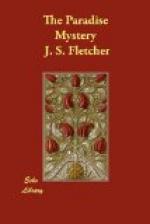“We are unexpectedly able to get some evidence of identity, gentlemen,” he observed. “The gentleman who has just stepped into the witness-box is Mr. Alexander Chilstone, manager of the London & Colonies Bank, in Threadneedle Street. Mr. Chilstone saw particulars of this matter in the newspapers this morning, and he at once set off to Wrychester to tell us what he knows of the dead man. We are very much obliged to Mr. Chilstone—and when he has been sworn he will perhaps kindly tell us what he can.”
In the midst of the murmur of sensation which ran round the court, Bryce indulged himself with a covert look at Ransford who was sitting opposite to him, beyond the table in the centre of the room. He saw at once that Ransford, however strenuously he might be fighting to keep his face under control, was most certainly agitated by the Coroner’s announcement. His cheeks had paled, his eyes were a little dilated, his lips parted as he stared at the bank-manager —altogether, it was more than mere curiosity that was indicated on his features. And Bryce, satisfied and secretly elated, turned to hear what Mr. Alexander Chilstone had to tell.
That was not much—but it was of considerable importance. Only two days before, said Mr. Chilstone—that was, on the day previous to his death—Mr. John Braden had called at the London & Colonies Bank, of which he, Mr. Chilstone, was manager, and introducing himself as having just arrived in England from Australia, where, he said, he had been living for some years, had asked to be allowed to open an account. He produced some references from agents of the London & Colonies Bank, in Melbourne, which were highly satisfactory; the account being opened, he paid into it a sum of ten thousand pounds in a draft at sight drawn by one of those agents. He drew nothing against this, remarking casually that he had plenty of money in his pocket for the present: he did not even take the cheque-book which was offered him, saying that he would call for it later.
“He did not give us any address in London, nor in England,” continued the witness. “He told me that he had only arrived at Charing Cross that very morning, having travelled from Paris during the night. He said that he should settle down for a time at some residential hotel in London, and in the meantime he had one or two calls, or visits, to make in the country: when he returned from them, he said, he would call on me again. He gave me very little information about himself: it was not necessary, for his references from our agents in Australia were quite satisfactory. But he did mention that he had been out there for some years, and had speculated in landed property—he also said that he was now going to settle in England for good. That,” concluded Mr. Chilstone, “is all I can tell of my own knowledge. But,” he added, drawing a newspaper from his pocket, “here is an advertisement which I noticed in this morning’s Times as I came down. You will observe,” he said, as he passed it to the Coroner, “that it has certainly been inserted by our unfortunate customer.”




